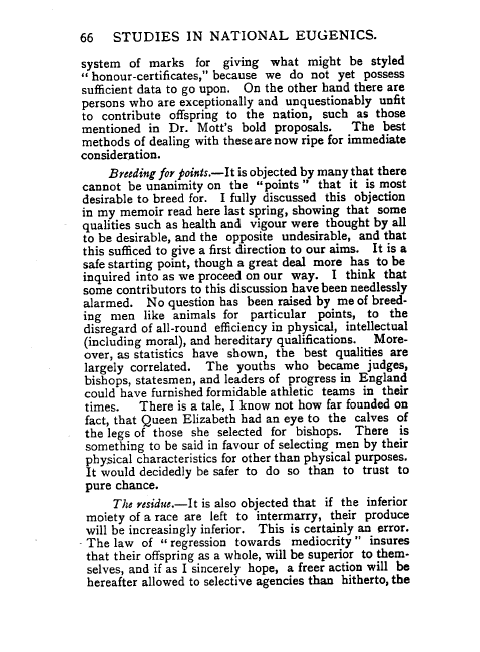66 STUDIES IN NATIONAL EUGENICS.
system of marks for giving what might be styled 11 honour-certificates," because we do not yet possess sufficient data to go upon. On the other hand there are persons who are exceptionally and unquestionably unfit to contribute offspring to the nation, such as those mentioned in Dr. Mott's bold proposals. The best methods of dealing with these are now ripe for immediate consideration.
Breeding for Points.-It is objected by many that there cannot be unanimity on the "points" that it is most desirable to breed for. I fully discussed this objection in my memoir read here last spring, showing that some qualities such as health and vigour were thought by all to be desirable, and the opposite undesirable, and that this sufficed to give a first direction to our aims. It is a safe starting point, though a great deal more has to be inquired into as we proceed on our way. I think that some contributors to this discussion have been needlessly alarmed. No question has been raised by me of breeding men like animals for particular points, to the disregard of all-round efficiency in physical, intellectual (including moral), and hereditary qualifications. Moreover, as statistics have shown, the best qualities are largely correlated. The youths who became judges, bishops, statesmen, and leaders of progress in England could have furnished formidable athletic teams in their times. There is a tale, I know not how far founded on fact, that Queen Elizabeth bad an eye to the calves of the legs of those she selected for bishops. There is something to be said in favour of selecting men by their physical characteristics for other than physical purposes. It would decidedly be safer to do so than to trust to pure chance.
The residue.-It is also objected that if the inferior moiety of a race are left to intermarry, their produce will be increasingly inferior. This is certainly an error. The law of '° regression towards mediocrity " insures that their offspring as a whole, will be superior to themselves, and if as I sincerely hope, a freer action will be hereafter allowed to selective agencies than hitherto, the

